|
 Secure Site
Secure Site
|
 |
Archive for March, 2012
 Yoga timers made from bamboo The Digital Zen Clock is the perfect companion for a natural lifestyle. Its long-resonating acoustic chime set in a solid hardwood case adds tranquility and aesthetic pleasure to any environment or activity. Used as an alarm clock, its gradually-increasing chime progression sequence begins your day with grace and beauty. As a timing device the Digital Zen Clock’s acoustic chime is unsurpassed for yoga, meditation, bodywork, or any practice.
 yoga and meditation timers Now & Zen
1638 Pearl St.
Boulder, CO 80302
(800) 779-6383
Posted in Bamboo Chime Clocks, yoga, Yoga Timer, Yoga Timers by Now & Zen
 Meditation Timers As a result of fifteen years of product evolution at Now & Zen, we have created the world’s ultimate alarm clock, practice timer, and “mindfulness bell.” Our Zen Timepiece’s acoustic 6-inch brass bowl-gong fills your environment with beautifully complex tones whenever it strikes. In the morning, its exquisite sounds summon your consciousness into awakening with a series of subtle gongs that provide an elegant beginning to your day. When the alarm is triggered, the long-resonating gong strikes just once … then automatically, it strikes again in 3-1/2 minutes … then in 2 minutes … then in 1 minute … As shown in the chart below, the gong strikes gradually increase over 10 minutes, eventually striking every 5 seconds until turned off. Once you experience the Zen Timepiece’s progressive awakening, you’ll never want to wake up any other way. It also serves as the perfect meditation timer.
 Stillness of Being Now & Zen
1638 Pearl St.
Boulder, CO 80302
(800) 779-6383
Posted in Meditation Timers
 COURTESAN OF MONTOYA by Suzuki Harunobo By Fleda Brown
Our local sangha had our 4-hour block meditation yesterday–people coming and going, with a number of us staying and sitting the whole time. Plus our 30-minute snack time afterward, which is gradually creeping into the realm of an actual meal, so much food!
Since we had no discussion group to tell you about, I thought for today I’d offer a few more poems you may not know. Here are two from Ryokan (1758-1831), a Japanese Buddhist hermit who spent much of his time writing poetryand doing calligraphy. His poetry is simple and inspired by nature. He loved children, and supposedly sometimes forgot to beg for food because he was playing with the children of the nearby village. Ryōkan refused to accept any position as a priest or even as a “poet.”
Too lazy to be ambitious,
I let the world take care of itself.
Ten days’ worth of rice in my bad;
a bundle of twigs by the fireplace.
Why chatter about delusion and enlightenment?
Listening to the rain on my roof,
I sit comfortably, with both legs stretched out.
And another:
The man pulling radishes
pointed the way
with a radish.
What I notice in what I’ll call “Buddhist poetry” is the way it takes the authority of the moment for granted. It doesn’t ask anything of me, the reader, other than to be a companion to the poem. It lacks decoration and it lacks self-consciousness, almost as if the speaker has to work up the energy to write it down, the poem that has just occurred to him/her.
We don’t fly away in these poems, as the nineteenth century poet John Keats put it, on the “wings of Poesy.” We don’t fly away anywhere. We are where we are, right here, and that’s just fine. Or, more to the point, it is what it is.
 Peonies, c. 1900 Here’s another poem by Ghalib (1797-1869), a Persian poet from India. It’s translated by Jane Hirshfield, a contemporary Buddhist poet:
For the raindrop, joy is in entering the river—
Unbearable pain becomes its own cure.
Travel far enough into sorrow, tears turn to sighing;
In this way we learn how water can die into air.
When after a heavy rain, the stormclouds disperse,
Is it not that they’ve wept themselves clear to the end?
If you want to know the miracle, how wind can polish a mirror,
Look: the shining glass grows green in spring.
It’s the rose’s unfolding, Ghalib, that creates the desire to see—
In every color and circumstance, may the eyes be open for what comes.
This one seems a bit like a “teaching poem,” doesn’t it? It doesn’t seem to be just opening the immediate moment to a companion—it’s “telling me” something. But look again: it’s telling the speaker himself something. He’s speaking this to himself. So really, it looks as if it’s the same simple seeing as in the poems by Ryokan.
adapted from Spirituality and Health Magazine, Feb. 2012
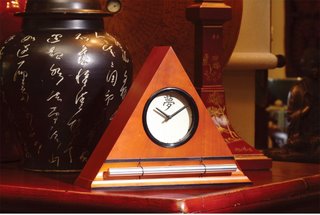 soothing chime alarm clocks Now & Zen
1638 Pearl St.
Boulder, CO 80302
(800) 779-6383
Posted in Chime Alarm Clocks, Zen Alarm Clock
 meditation sunrise Big Sky Mind
After a while, turn your attention from the surface of the lake toward the sky itself. Then imagine shifting your gaze from the reflections, the passing phenomena, to the sky within which they all arise and pass away. The sky is boundless, limitless. It contains everything that arises. The horizon is only a perceptual or conceptual boundary that can never be reached. Even on the cloudiest day, the sky is luminous above the clouds, pervasive, limitless, and free.
Awareness has the qualities of luminosity and limitlessness. It is present always, behind, between, and beyond all the ever-changing phenomena. Whenever you catch yourself identifying with the mental “clouds,” simply shift your identification from the clouds to the sky itself. Realize that what you’ve been seeking is what you already are and have always been! Big Sky Mind opens us to seeing that our true nature is this awareness within which all experience arises and passes away.
Our Zen Timepiece’s acoustic 6-inch brass bowl-gong clock is the world’s ultimate alarm clock, practice timer, and “mindfulness bell.”
It fills your environment with beautifully complex tones whenever it strikes. In the morning, its exquisite sounds summon your consciousness into awakening with a series of subtle gongs that provide an elegant beginning to your day. Once you experience the Zen Timepiece’s progressive awakening, you’ll never want to wake up any other way. It also serves as the perfect meditation timer.
adapted from Yoga Journal, by Frank Jude Boccio
 Zen Timepiece with brass singing bowl, a meditation timer Now & Zen
1638 Pearl Street
Boulder, CO 80302
(800) 779-6383
Posted in intention, Japanese Inspired Zen Clocks, Meditation Timers, Meditation Tools, mindfulness practice, Now & Zen Alarm Clocks, Well-being, Zen Timers
 yawning can help battle stress You’re probably familiar with the situation; you’re sitting in a waiting room, watching the clock. The person sitting across from you yawns and, as if on cue, you also yawn.
Yawning typically signifies tiredness or boredom, yet researchers in Britain have proved otherwise. In fact, “contagious” yawning, that is, yawning after you see someone else yawn, is a sign of empathy.
Back in the day of cave dwellers and nomadic hunters, yawning was a way to raise alertness, as it increased the flow of blood and oxygen to the brain. Scientists think yawning developed into a warning signal, as if a yawn meant to wake up and watch for danger. Yawning was a survival skill.
Nowadays, yawning typically happens after a night with too-little sleep, in a long meeting, or while waiting, yet the contagious yawn still is a warning to wake up. Instead of being used as a warning for possible trouble ahead, yawning is used to silently empathize with your neighbor.
Boulder, Colorado—an innovative company has taken one of life’s most unpleasant experiences (being startled awake by your alarm clock early Monday morning), and transformed it into something to actually look forward to. “The Zen Alarm Clock,” uses soothing acoustic chimes that awaken users gently and gradually, making waking up a real pleasure. Rather than an artificial recorded sound played through a speaker, the Zen Clock features an alloy chime bar similar to a wind chime. When the clock’s alarm is triggered, its chime produces a long-resonating, beautiful acoustic tone reminiscent of a temple gong. Then, as the ring tone gradually fades away, the clock remains silent until it automatically strikes again three minutes later. The frequency of the chime strikes gradually increase over ten-minutes, eventually striking every five seconds, so they are guaranteed to wake up even the heaviest sleeper. This gentle, ten-minute “progressive awakening” leaves users feeling less groggy, and even helps with dream recall.
adapted from Natural Solutions Magazine, Oct. 2011
 soothing, elegant chime alarm clocks, with real acoustic sounds Now & Zen’s Alarm Clock Store
1638 Pearl Street
Boulder, CO 80302
(800) 779-6383
Posted in Chime Alarm Clocks, sleep
 meditation timers with elegant soothing chimes The Zen Alarm Clock’s long-resonating Tibetan bell-like chime makes waking up a beautiful experience — its progressive chimes begin your day with grace. When the Clock’s alarm is triggered, the acoustic chime bar is struck just once … 3-1/2 minutes later it strikes again … chime strikes become more frequent over 10 minutes … eventually striking every 5 seconds until shut off (see the chime progression graph, below). As they become more frequent, the gentle chimes will always wake you up — your body really doesn’t need to be awakened harshly, with a Zen Clock you’re awakened more gradually and thus more naturally. $129.95
 meditation timers with elegant soothing chimes, real acoustic sounds Now & Zen
1638 Pearl St.
Boulder, CO 80302
(800) 779-6383
Posted in Chime Alarm Clocks, Zen Alarm Clock
 why am I so tired? Before you chalk up your lethargy to chronic fatigue, first consider these other possible causes.
By Alice Lesch Kelly
You’re exhausted all the time. You can barely pull yourself out of bed in the morning, you’re sleepy in the afternoon, and you’re ready to hit the sack at sundown. Could you have chronic fatigue syndrome? It’s possible, but you may want to investigate these other common ailments as well:
Iron-deficiency anemia. People with IDA feel fatigued, laconic, and cold due to a lack of iron in their blood. Iron supplements can usually take care of the problem.
Depression. Not only does the worry and anxiety that accompany depression wear you out, it may also affect the quality of your sleep, leaving you constantly exhausted. If you suspect depression, consult with a therapist, who may recommend behavioral therapy, antidepressant medication, or other healing modalities.
Mitral valve prolapse. This is a condition in which a heart valve fails to work correctly, causing a heart murmur. People with MVP may feel tired for a number of reasons, including a decrease in REM sleep, low blood volume, and excess adrenaline. For some patients, drinking plenty of water can ease symptoms by boosting blood volume, although others require medication.
Sleep disorders. Conditions like sleep apnea, narcolepsy, and restless leg syndrome can interrupt sleep without sufferers even realizing they have them. Doctors treat these conditions in a variety of ways, including air pumps that aid nighttime breathing, medication, dietary changes, or massage.
Hypothyroidism. An underactive thyroid slows down metabolism, which leaves sufferers feeling tired and sometimes cold, constipated, or depressed. Daily thyroid replacement pills can get metabolism back on track.
Boulder, Colorado—an innovative company has taken one of life’s most unpleasant experiences (being startled awake by your alarm clock early Monday morning), and transformed it into something to actually look forward to. “The Zen Alarm Clock,” uses soothing acoustic chimes that awaken users gently and gradually, making waking up a real pleasure. Rather than an artificial recorded sound played through a speaker, the Zen Clock features an alloy chime bar similar to a wind chime. When the clock’s alarm is triggered, its chime produces a long-resonating, beautiful acoustic tone reminiscent of a temple gong. Then, as the ring tone gradually fades away, the clock remains silent until it automatically strikes again three minutes later. The frequency of the chime strikes gradually increase over ten-minutes, eventually striking every five seconds, so they are guaranteed to wake up even the heaviest sleeper. This gentle, ten-minute “progressive awakening” leaves users feeling less groggy, and even helps with dream recall.
 gentle chime alarm clocks Now & Zen’s Chime Alarm Clock Shop
1638 Pearl St.
Boulder, CO 80302
(800) 779-6383
adapted from Yoga Journal.com
Posted in wake up alarm clock, Well-being, Zen Timepiece by Now & Zen, Zen Timers
 Ohara Koson (1877~1945) Herons. Meiji period Now & Zen’s favorite architectural element in the castles of Japan (like, Matsumoto Castle, one of Japan’s finest historic castles) is the “moon-viewing” room.
This tradition is descripted below:
Tsukimi or Otsukimi, literally moon-viewing, refers to Japanese festivals honoring the autumn moon.
Tsukimi refers to the Japanese tradition of holding parties to view the harvest moon. The custom is thought to have originated with Japanese aristocrats during the Heian period, who would gather to recite poetry under the full moon of the eighth month of the lunisolar calendar, known as the “Mid-Autumn Moon.”
One of the ultimate Zen like experiences is waking-up from a great slumber refreshed and energized. Your mind and body are harmoniously one, both alert and focused. Having a refreshed mind and body are two keys to a natural and Zen lifestyle. Waking up in the morning should not be a loud and abrupt awakening, but rather it should be a peaceful positive experience. The right natural alarm clock can transition your deep and tranquil sleep into a serene start to consciousness. Imagine a long-resonating Tibetan bell-like chime waking you up to a beautiful morning experience.
The right alarm clock can be the most beneficial investment for you. With our Now & Zen natural alarm clock you are awakened more gradually and thus more naturally. Now & Zen is focused on creating a naturalistic lifestyle, and our clocks are an example of our philosophy.
Now & Zen’s – Meditation Timer and Alarm Clock Store
1638 Pearl Street
Boulder, CO 80302
(800) 779-6383
 Japanese Leaves Zen Alarm Clock
Posted in Japanese Inspired Zen Clocks, Natural Awakening, Now & Zen Alarm Clocks, Progressive Awakening
 Meditation The Meaning of OM
You’ve been om-ing your way through yoga class for years, but have you ever wondered what the mantra really means? According to the Yajur-Veda, one of the earliest sacred texts of the yoga tradition, om represents the entire universe — past, present, and future. The sound is actually a combination of four parts: a (“ah”), or wakefulness; u (“oh”), the dream state; m (“mmm”), the quietness of deep, dreamless sleep; and the silence that follows, which represents pure consciousness.
As yogis will attest, the vibrations of om help settle the mind in a profound way. But don’t wait until your next hatha class to say it. Use it whenever you need a quick infusion of calm.
Our Zen Timepiece’s acoustic 6-inch brass bowl-gong clock is the world’s ultimate alarm clock, practice timer, and “mindfulness bell.”
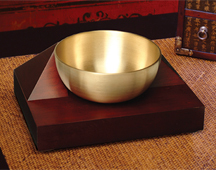 Meditation Timer and Singing Bowl Alarm Clock for Yoga and a Peaceful Awakening It fills your environment with beautifully complex tones whenever it strikes. In the morning, its exquisite sounds summon your consciousness into awakening with a series of subtle gongs that provide an elegant beginning to your day. Once you experience the Zen Timepiece’s progressive awakening, you’ll never want to wake up any other way. It also serves as the perfect meditation timer.
adapted from Whole Living Magazine, April/May 2007
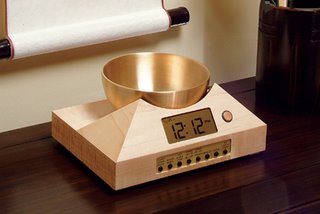 Zen Timepiece, a brass singing bowl clock and timer for meditation and yoga
Now & Zen
1638 Pearl Street
Boulder, CO 80302
(800) 779-6383
Posted in Meditation Timers, Meditation Tools, mindfulness practice, Well-being, Zen Timers
 meditation Meditation isn’t only about achieving peace for oneself!
by Shyalpa Tenzin Rinpoche
It is a misunderstanding to think that the practice of meditation is merely a method for relieving stress and achieving peace for oneself, alone.
In Buddhist tradition, the act of practicing meditation should be approached as a means to benefit others. In the same way, the momentum that grows out of this practice should also be dedicated to the welfare of all beings. Each time you sit down to meditate, make your practice an offering for all beings. Recognize that everyone is looking for ways to find happiness just as you are. Meditation is a means to this end. Sustained meditation practice will bring you joy, and a joyful mind will naturally benefit others. Resolve to meditate with this unselfish attitude.
When we begin meditation, we should first learn how to focus. Some discipline is required in order to be attentive in the moment and experience it fully. Most of the time, we are unable to focus our attention and are easily distracted. Our minds wander, and we are easily mesmerized by our perceptions and thoughts. We have a difficult time remaining focused.
There are many ways to practice meditation. Let’s explore one approach: Sit up straight. When you begin, breathe naturally. Slowly settle into your breathing by counting the in and out movement of your breath 21 times. Touch the tip of your tongue lightly to the roof of your mouth. If you become drowsy, your tongue will drop down and rouse you from your slumber. Raise your tongue to the roof of your mouth again and concentrate.
 sitting meditation, a wellness practice If possible, sit with your legs crossed, keep your eyes open, and look straight ahead, beyond the tip of your nose. I would advise you not to close your eyes. If you were to suddenly encounter a tiger in the jungle and were overcome with fear, closing your eyes would not make the tiger run away. Similarly, when you meditate, closing your eyes will not make your distracting thoughts and feelings disappear. You will be alert and prepared to face any challenge when you keep your eyes open. You may think you can meditate more effectively with your eyes closed, but most likely, you are not meditating better, you are sleeping better.
Once you have adjusted your body and settled into your breathing, focus on a specific object, such as the form of the Buddha. This could be an actual statue or an image visualized in the mind’s eye. You could select one aspect, such as the Buddha’s gentle eyes or his golden color. When you notice that your mind has wandered away from its focal point, gently bring it back. If you find yourself thinking about your stock portfolio or that you forgot to turn on the dishwasher, return your attention to the Buddha’s image. The value of your stock portfolio is a mundane matter and your dirty dishes can wait. The mind is running around like a restless monkey all the time. Obviously, this practice can be quite challenging. Observe how long you can hold the object of your attention without wandering. If you can hold your attention steady for five minutes, you are a great meditator already! Most likely, you will lose your focus, jumping from one thought to the next, like a monkey leaping from tree to tree. Staying with the object without drifting away is very difficult; it will take all of your attention and resolve. Throughout your day, you can practice this meditation technique whenever you have some free time.
Practice meditation for whatever length of time you wish. However, in the beginning, practice for short periods, perhaps just five minutes. After meditating for five minutes, you might feel that you are struggling with your mind. If so, relax and tell yourself, “You spoiled brat, go wherever you like!” Let your mind wander as far as Paris, New York, or Shanghai. You can move your body, stretch, dance, or go a little crazy. Once you feel refreshed, return to your meditation again for five more minutes. Proceed like this—concentrating and then relaxing—for perhaps half an hour to an hour. Practice for whatever length of time you find comfortable, without overexerting yourself. Maintaining unwavering attention for five minutes is much better than getting lost in distraction for five hours.
This basic practice of focusing attention is important, even for the most advanced practitioners. If you allow a glass full of muddy water to sit undisturbed, the dirt will settle to the bottom, leaving a glass of pure water. Practicing this simple technique of focusing and restoring your attention when your mind wanders will pacify your restless thoughts. It will calm your mind, and with sustained practice, you will experience lucidity and pure presence.
When you practice meditation, the trials and tribulations—the highs and lows—of your day-to-day life will not disturb you too much, since your body and mind will be more relaxed. There will be a more intimate connection between your meditation practice and whatever comes up in your life. Even if chaotic or fearsome events turn your world upside-down, you will have more space and less stress. If your life swerves off the road and crashes, the fruits of your practice will act like an airbag, buffering you against serious injury. You will have the strength and clarity to master challenging situations.
Practice by focusing and holding your attention. If you cannot discipline yourself in this way, you could easily find yourself behaving like a spoiled and pampered child who feels helpless when confronted with a challenging situation.
When you develop the capacity to be present, you will respond competently, no matter what the circumstances.
Endeavor to practice some form of meditation each day. Even if you are transacting million-dollar business deals, this will pale in comparison to the rewards of a regular meditation practice. You can live without a milliondollar deal, but you cannot live without inner peace and well-being. So be good to yourself. Make a profound deal with yourself to practice every day. Set aside a little time for meditation, and then gradually spend more and more time practicing. In this way, the truth of the teachings will unfold within the depths of your heart. If you allow these teachings to remain only in your head, you could carelessly misuse the rest of your precious human life. This is not a practice for beginners only. Everyone must master this discipline before they can proceed further in their practice.
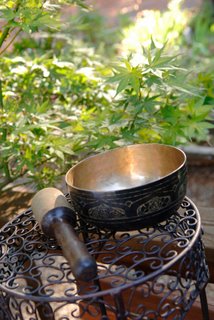 Sing Bowl After meditating, rejoice and dedicate the fruits of your practice to all beings. With joy, rest in a sublime state. Make this aspiration:
“Whatever benefit I have gained from this practice, may the residual effects last for many days, years, and lifetimes. May everyone, including myself, benefit from the wisdom and clarity accumulated in this practice, until all beings attain enlightenment. Whatever merit I have gained, I dedicate it for the welfare of all sentient beings.”
By making this dedication, you will preserve this positive energy, and your practice will grow stronger in the future.
You can draw on this energy for the dual benefit of yourself and others. In the Buddhist tradition, there are three sublime practices:
The first sublime practice is the generation of a compassionate and loving heart, also known as pure intention. We begin each activity with the positive intention that our action will be of benefit to others.
The second sublime practice is the activity or practice itself, which we do mindfully, while remaining in the natural state, free from distraction.
The third sublime practice is the dedication of merit. Merit refers to the wholesome and positive momentum that grows from our practice. We dedicate our most precious essence and all the positive energy that we have accumulated from our practice to the welfare of all beings.
Apply these three sublime practices in all of your activities, even something as simple as drinking a cup of tea. Prepare your tea while generating a compassionate heart, the pure intention to benefit all sentient beings. This is the first practice. Then drink the cup of tea with complete mindfulness. This is the second practice and the core of the three practices. After your last sip, dedicate the enjoyment of your drink for all beings, and pray that they may be liberated from suffering and awaken to enlightenment.
The rays of the sun provide warmth for all creatures without discrimination. We dedicate the virtue of every positive action to the benefit of all beings. In this tradition, we do not hold on to the merit that we have accumulated for our own benefit alone, but instead we dedicate this positive energy so that someday the enlightened qualities of every being will manifest. Finally, the perfect dedication is to dissolve your merit in the unconditional state.
 drinking tea as a mindfulness practice In this way, simply drinking a cup of tea becomes genuine meditation because of the three sublime practices. Always insure that these practices are inseparable from whatever you do. The first and last are quite straightforward. In the case of the second sublime practice, you have a specific target. For instance, if your activity is meditation on the breath, follow your breath attentively, and at the same time be mindful of its ephemeral quality. The three sublime practices are the best way to elevate your thinking and walk with dignity on the path of awakening.
The goal of our practice is to free ourselves from stress and suffering. We cannot actualize this freedom using a purely intellectual approach. We need to experience these teachings directly and embody them in our lives. This is why I strongly recommend the practice of meditation.
As beginners, we must embrace the practice of meditation. Even if the discipline of meditation does not come easily, we should endeavor to practice. We have to tame our neuroses and pacify our restless minds.
Steady discipline, combined with joyful effort, is the best way to respect and care for yourself. As your practice progresses, you will begin to reap the rewards. You will carry yourself in a majestic way and experience the regal qualities of your wakeful nature. Like a king in command of his subjects, you will master your mind and emotions.
Every moment is a new moment, so we need a fresh approach to meditation that can be practiced by everyone, anywhere in the world. Our meditation will be pristine when we recollect, with an open heart, the basic goodness in all beings. There is no time to be narrowminded or territorial, as life is too precious to waste. We should not spoil a single moment with an unwholesome thought. This dynamic form of meditation can be practiced nonstop, so that living itself becomes meditation.
 Kids meditation Moment-to-moment awareness is the supreme form of meditation. All other methods of meditation are steps that lead us toward this all-pervasive awareness. Recognizing the essence of one’s mind and learning to remain in this essence is true meditation. In Tibetan, meditation means “getting used to.” We could say that meditation is not the goal, but a tool that helps us discover or “get used to” the true nature of mind. Once you realize the truth, you no longer need the tool. When resting in the mind’s nature, there is nothing left to meditate on because the mind is no longer distracted! There is nothing more to grow accustomed to. Nonmeditation is the ultimate meditation. Whatever comes, you are capable of handling it because everything is self-liberated as it arises.
If you must have a quiet and secluded place to meditate, your practice is still ordinary. However, with moment-to-moment awareness we can manage any situation. This is what we need the most because life is often chaotic and challenging. We have to survive and navigate the strains and stresses of everyday life. Buddhist practice is not simply a matter of reciting mantras, chanting prayers, and quietly meditating. True practice means learning to handle every situation skillfully.
Whatever you are doing, do it comfortably. Proceed in a relaxed and natural manner. You will experience thoughts arising one after the other. A thought comes and it goes. When you are alert and aware, you will not get lost in your thoughts. It will be clear that you are not your thoughts and that your thoughts do not define you. Thoughts are like the flight of a bird through the sky: the path of the bird leaves no trace. Each thought has no dwelling place or destination. When you train this way, the “possessor” of these thoughts will eventually disappear. At this point, there will be no one to suffer or experience any torment. This is moment-to-moment awareness and the perfection of nonmeditation.
Our Zen Timepiece’s acoustic 6-inch brass bowl-gong clock and timer is the world’s ultimate alarm clock, practice timer, and “mindfulness bell.”
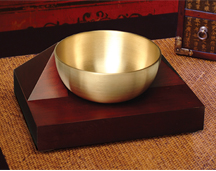 Zen Timepiece with Singing Bowl, the Ultimate Meditation Timer Adapted from the book Living Fully: Finding Joy in Every Breath ©2012 by Shyalpa Tenzin Rinpoche. Printed with permission from New World Library. Shyalpa Tenzin Rinpoche is the son of spiritual Buddhists and a renowned Tibetan Buddhist spiritual leader.
 Meditation timers and alarm clocks with acoustic chimes Now & Zen’s Meditation Timer Shop
1638 Pearl St.
Boulder, CO 80302
(800) 779-6383
Posted in mindfulness practice
« Previous Page — « Previous Entries
Next Entries » — Next Page »
|
|
|
|